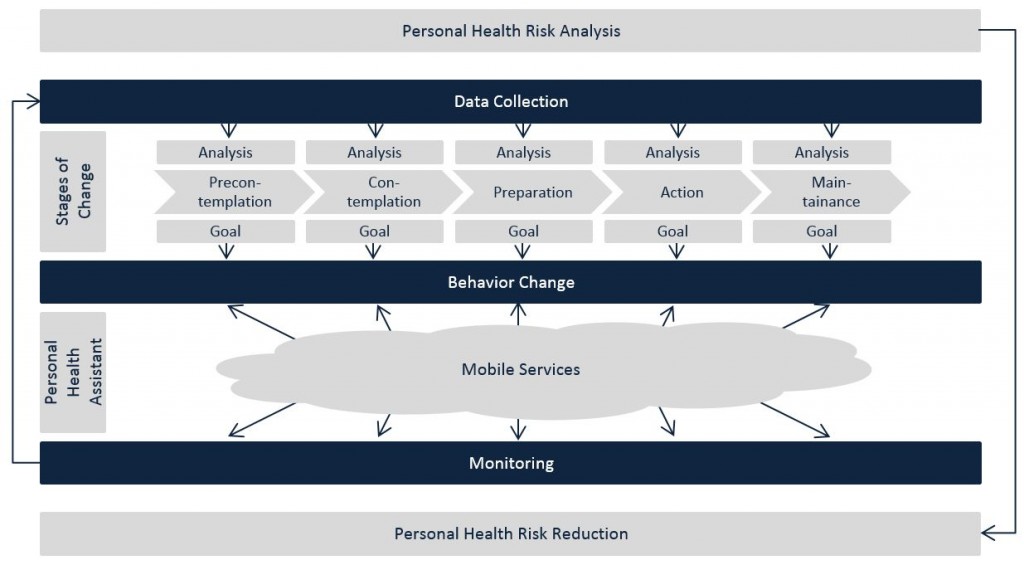Context-Sensitive Motivation for Healthy Behavior in Everyday Life
Abstract
The research project Personal Health Risk Management aims at promoting physical activity to reduce cardiovascular health risks with the automated collection and analysis of activity and behavior pattern in everyday life. Depending on the individual risk profile and psychological characteristics, the user is influenced with motivational strategies.
Mobile sensors for non-invasive measurement of body values are combined with smartphone sensors. Data mining algorithms constantly analyse behavior data to detect situations, where a behaviour change is appropriate. Learning the users behavioural pattern and habits over time helps to understand the user. By combining this information, mobile services to boost motivation are offered in the right way at the right time.
Research Picture
Related Student Reports (excerpt)
-
Experts know best – Die Integration von Expertenwissen in eine Sport- und Fitnessanwendung
(Dominik Nübler; Master Thesis; 2015) -
Smart Digital Fitnesschoaching – Situative Verhaltensbeeinflussung durch KI-basierte Aktivitätsanalyse
(Isabel Muswieck; Master Thesis; 2014) -
Übertragung eines etablierten Motivationskonzeptes auf ein Serious Game Konzept für jugendliche Intensivnut-zer von Computerspielen
(Patrick Hanslbauer; Bachelor Thesis; 2014) -
Prototypische Umsetzung einer sensorgestützten Appli-kation zur kontinuierlichen Erfassung von präventions-relevanten Aktivitätsdaten
(Steffen Henne; Bachelor Thesis; 2014) -
Umsetzung von Strategien zur Verhaltensbeeinflussung in einer prototypischen Smartphone-Anwendung zur Bewegungsförderung
(Alexander Popp; Bachelor Thesis; 2014) -
Formalisierung medizinischen Expertenwissens für IT-gestützt Präventionsassistenten
(Ariane Hebebrand; Bachelor Thesis; 2014) -
Analyse des Nutzerverhaltens durch Sensordaten mobiler Endgeräte
(Marc Wallrath; Bachelor Thesis; 2013) -
Forschungstrends im Bereich Persuasive Technology
(Rebecca Dorn; Bachelor Thesis; 2013) -
Analyse der Quantified Self Bewegung und ihrer Potenziale zur Nutzung in der professionellen Gesundheitsförderung
(Sonja Lugmair; Bachelor Thesis; 2013) -
How can Bonus System increase motivation for physical activity to impact NCDs and risk factors
(Bruno Taurino; Master Thesis; 2013) -
Analyse der Übertragbarkeit von Personal Fitness Coaching auf Mobilgeräte
(Sabrina Hofer; Bachelor Thesis; 2013) -
Identifikation und Analyse von Nutzergruppen für mobile Fitness Anwendungen
(Cindy Wiebe; Bachelor Thesis; 2013) -
Analyse der Übertragbarkeit von GKV-Bonusprogrammen auf smartphonebasierte Anreizsysteme
(Waldemar Stauber; Bachelor Thesis; 2012) -
Preventive healthcare through persuasive technology: A market analysis on mobile applications
(Tino Müller; Master Thesis; 2012) -
Creation of a service portfolio for mobile health and fitness applications to change the behavior of non-movers
(Jonathan Wendt; Master Thesis)

